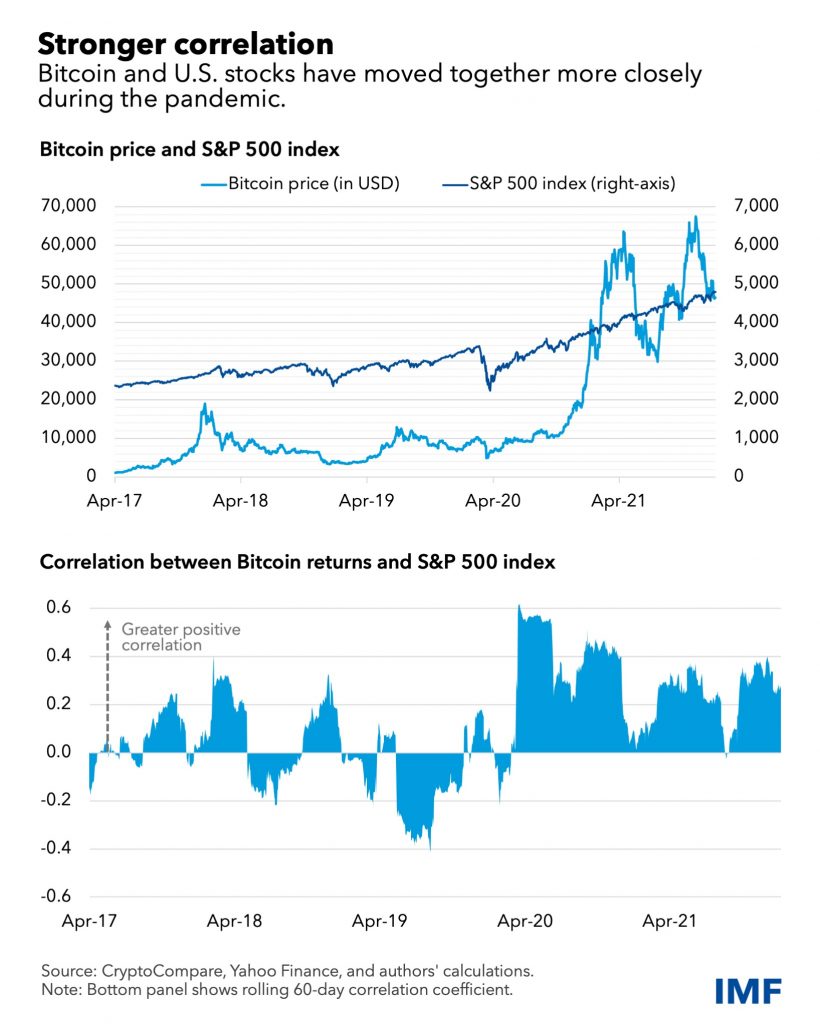
-
The IMF says Bitcoin’s high correlation with stocks means it’s more of a risk asset.
-
The financial institution calls for greater global regulation of the ecosystem to reduce potential risks to the rest of the market.
Bitcoin has outperformed the S&P 500 since 2017, with little to no correlation to the stock indexes before 2019 when the Covid-19 pandemic hit.
Since then, Bitcoin and other cryptocurrencies have largely moved in sync with the major stocks on Wall Street.
After plummeting in March 2020, crypto and equities began to surge as investors returned to risky assets, a scenario that now sees the International Monetary Fund (IMF) say could pose contagion risks to the broader financial markets.
“The correlation coefficient of their daily moves was just 0.01[before 2020], but that measure jumped to 0.36 for 2020–21 as the assets moved more in lockstep, rising together or falling together,” the Washington DC-based financial institution said.
 Chart showing a correlation between Bitcoin and the S&P 500. Source: IMF blog
Chart showing a correlation between Bitcoin and the S&P 500. Source: IMF blog
While the IMF report published on 11 January states that cryptocurrencies “are no longer on the fringe of the financial system,” it takes a negative view of the correlation with stocks.
The report claims that Bitcoin’s increased adoption and the rising correlation it’s showing with stocks limits the supposed “risk diversification benefits” that see many investors opting for it over traditional safe have assets such as gold.
The correlation between Bitcoin and the S&P 500 is shown to be way higher than seen between stocks and gold and major global currencies.
And the IMF says the lockstep trading seen with the stock market suggests Bitcoin is more of a risky asset and not a hedge asset.
According to the IMF, this puts the markets at risk- specifically saying it threatens “contagion across financial markets.”
In its assessment, the institution says any sharp declines across the Bitcoin market threaten risk aversion among investors. This, it adds, might see investors aver from investing in stocks.
“Spillovers in the reverse direction—that is, from the S&P 500 to Bitcoin—are on average of a similar magnitude, suggesting that sentiment in one market is transmitted to the other in a nontrivial way," the report added.
Pointing to systemic concerns, IMF suggests the adoption of a global regulatory framework targeted at oversight and potentially helping to stem risks to the financial system.
In December, CNBC’s “Fast Money” trader Brian Kelly said Bitcoin and Nasdaq were trading in lockstep. He pointed to the 30-day correlation as having been around 47% at the time, with Bitcoin usually a leading indicator for the stocks index.

